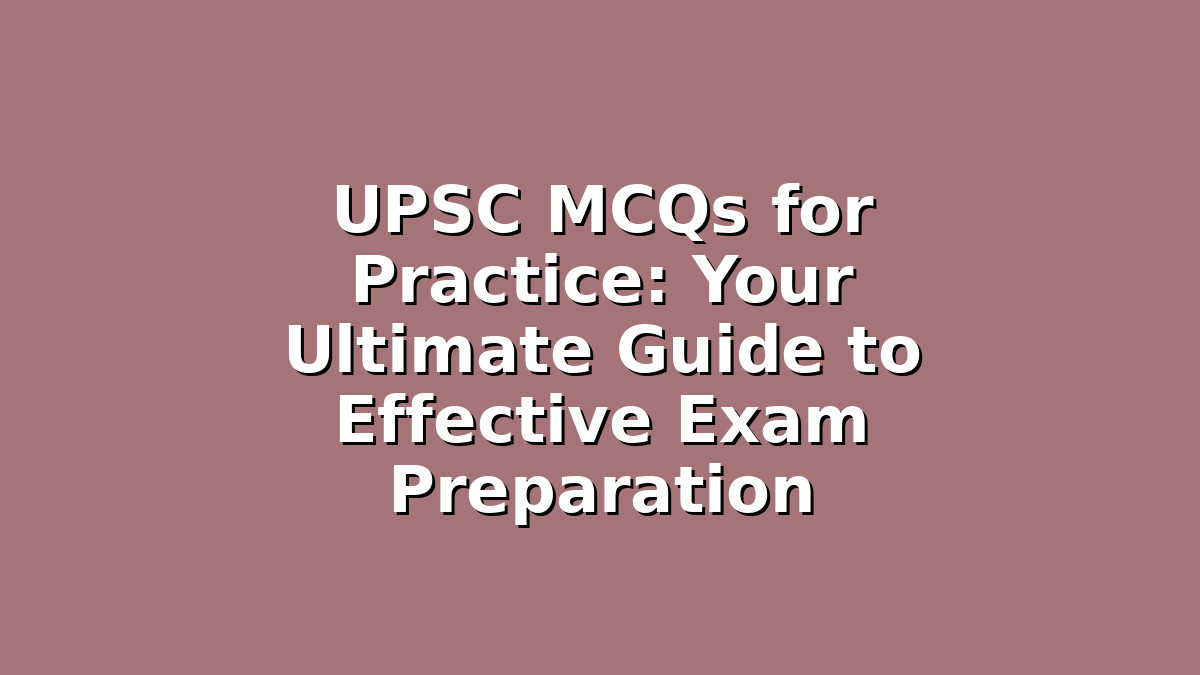Preparing for the UPSC (Union Public Service Commission) examination is a challenging yet rewarding journey. As one of the toughest competitive exams in India, it demands not only thorough knowledge but also sharp analytical skills and time management. One of the most effective ways to boost your preparation is through practicing UPSC MCQs (Multiple Choice Questions). This method not only tests your understanding but also helps in improving speed and accuracy.
In this comprehensive guide, we will explore why practicing UPSC MCQs is essential, how to incorporate them effectively into your study routine, and tips to maximize your performance using MCQs.
Why Practice UPSC MCQs?
The UPSC exam pattern has evolved over the years, incorporating objective-type questions especially in the Preliminary stage. The Prelims comprise two papers: General Studies Paper I and CSAT (Civil Services Aptitude Test). Both papers heavily rely on MCQs. Therefore, mastering MCQ practice is non-negotiable for candidates aiming to clear the preliminary stage and progress further.
Key Benefits of Practicing UPSC MCQs:
1. Enhanced Conceptual Clarity: MCQs cover a wide spectrum of topics, helping you understand subjects in a concise and focused manner. When you practice regularly, you reinforce your learning and identify areas that need improvement.
2. Improved Time Management: The UPSC Prelims are time-bound; you have to answer 200 questions in 2 hours. Practicing MCQs trains you to read carefully, analyze quickly, and select the right option under pressure.
3. Familiarity with Exam Pattern: Regular MCQ practice acquaints you with the nature and difficulty level of questions you might encounter, reducing exam-day anxiety.
4. Self-Assessment: MCQs provide instant feedback. This helps you track your performance, spot weak topics, and refine your strategies accordingly.
Section 1: How to Integrate UPSC MCQs into Your Study Plan
To reap the full benefits of MCQs, avoid random practice. Instead, integrate MCQs systematically into your preparation.
a) Start with Conceptual Learning
Before jumping into MCQs, ensure you have a solid grasp of the fundamental concepts from standard UPSC books and resources. For instance, read NCERT textbooks, Laxmikanth for Polity, or Spectrum for Modern History. This foundation will help you understand the questions better.
b) Topic-wise Practice
Divide your syllabus into smaller topics and practice MCQs specific to those areas. For example, if you are studying Indian Geography, solve related MCQs immediately after completing that chapter. This approach helps reinforce concepts and improves retention.
c) Schedule Daily MCQ Practice
Dedicate at least 30-60 minutes daily for MCQ practice. Consistency is key. Use reliable sources like online test series, UPSC preparation apps, or question banks from reputed coaching institutes.
d) Analyze Your Mistakes
After attempting MCQs, don’t just check the right answers. Analyze why you made mistakes. Was it due to lack of knowledge, misreading the question, or negative marking fear? Understanding your errors helps avoid repetition.
Section 2: Tips for Effective UPSC MCQ Practice
Adopt smart strategies to maximize your MCQ practice outcomes.
1. Focus on Accuracy Over Guesswork
Since UPSC Prelims deduct 1/3rd negative marks for wrong answers, it’s crucial to avoid wild guesses. If unsure about an answer, try to eliminate obviously incorrect options first. This improves your chances of selecting the right choice.
2. Use Mock Tests to Simulate Exam Conditions
Regularly take full-length mock tests under timed conditions. This practice builds stamina and helps you manage the pressure of answering 100 questions per paper within 2 hours. Post-test review is equally important to identify topics that need revision.
3. Revise Frequently
MCQ practice should go hand in hand with revision. Many UPSC questions test your memory of facts, dates, and concepts. Repeated revision combined with MCQs cements this knowledge.
4. Build Your Own Question Bank
Create a personalized question bank from your practice sessions, notes, and previous year UPSC MCQs. Regularly revisit this bank to keep concepts fresh and improve recall speed.
5. Focus on Current Affairs MCQs
A significant portion of UPSC MCQs, especially in General Studies, come from current affairs. Develop a habit of reading newspapers daily and solving related MCQs to stay updated.
Section 3: Resources and Tools for UPSC MCQs Practice
Choosing the right study material and tools can make your MCQ practice more efficient and enjoyable.
a) Previous Year Question Papers
Analyzing previous years’ UPSC Prelims question papers is indispensable. It helps you understand trends, frequently asked topics, and question framing style.
b) Online Platforms and Apps
In today’s digital age, multiple online platforms offer quality UPSC MCQs with detailed explanations. Websites like Insights on India, ClearIAS, and apps such as Unacademy and BYJU’S provide structured MCQ practice tailored for UPSC aspirants.
c) Standard Reference Books with MCQs
Some UPSC preparation books come with MCQ sections—for example, “Indian Polity MCQs” by M. Laxmikanth or “Modern History MCQs” by Spectrum. These books help reinforce your subject knowledge through practice.
d) Test Series by Coaching Institutes
Joining a reputable test series provides access to a wide array of MCQs, regular evaluation, and feedback from experts. This also helps maintain a competitive environment and pressure similar to the actual exam.
e) Flashcards and Quiz Games
For quick revision, use flashcards or quiz apps that allow you to practice UPSC MCQs on the go. These tools make learning interactive and help retain facts effectively.
Conclusion
UPSC MCQs are more than just a testing tool—they are a powerful learning aid that can significantly enhance your preparation. By incorporating regular, focused MCQ practice into your study routine, you not only improve your conceptual clarity but also gain the confidence needed to tackle one of India’s most competitive exams.
Remember, success in UPSC requires patience, perseverance, and smart work. Use MCQs to identify your strengths and weaknesses, maintain consistency, and adapt your strategies accordingly. With dedicated practice and the right mindset, cracking the UPSC exam is well within your reach.
Stay motivated, keep practicing, and believe in your potential!

Responses